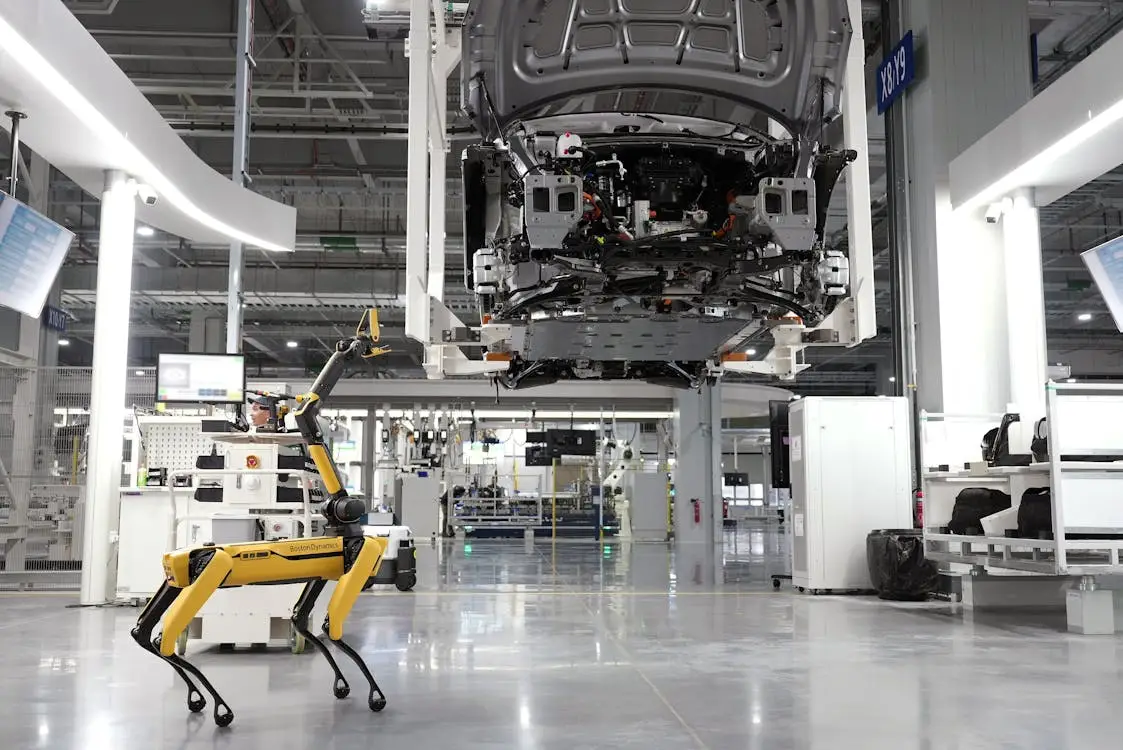Picture this: your online shopping cart suggests the perfect addition before you even realize you need it, your emails draft themselves, and your business decisions are guided by precise insights that feel like magic. That’s not science fiction; it’s the reality of business in 2025. Artificial intelligence (AI) has seamlessly integrated into industries’ operations, innovation, and competition.
AI is no longer just a tool; it’s a collaborator, a strategist, and an efficiency expert rolled into one. From automating mundane tasks to empowering groundbreaking innovation, AI has transformed industries and redefined the rules of the game. This article delves into AI’s profound impact across sectors, the opportunities it unlocks, and the challenges it brings.
Key Takeaways
- Industry Revolution: AI is transforming industries like manufacturing, retail, healthcare, finance, and marketing by automating tasks, enhancing precision, and enabling innovative solutions.
- Workplace Evolution: AI boosts productivity, creates new roles, and fosters hybrid teams of humans and machines while enabling employees to focus on creativity and problem-solving.
- Ethical and Regulatory Challenges: Businesses must address AI biases, protect privacy, and adapt to evolving regulations to implement responsible and ethical AI.
- Empowering Small Businesses: Affordable AI tools enable small businesses to enhance operations, personalize customer experiences, and compete with more prominent players.
- Future Potential: From advancing sustainability to unlocking innovations like quantum AI, the future promises a deeper integration of AI into business strategies and operations.
AI is reshaping workplaces by creating hybrid teams of humans and machines, boosting productivity while employees focus on creativity. The future is collaborative! 🌟 #ArtificialIntelligence #MachineLearning #TechInnovation
AI Across Industries: A Game-Changer

AI is reshaping industries from manufacturing to marketing. Here’s how it’s revolutionizing key sectors:
Manufacturing
- Automation at Scale: AI-powered robots handle everything from assembly lines to quality control, reducing errors and increasing output.
- Predictive Maintenance: Sensors and AI algorithms anticipate machinery failures before they occur, saving time and money.
- Design Optimization: AI-driven simulations enable manufacturers to test designs virtually, speeding up prototyping and reducing costs.
- Supply Chain Management: By analyzing global data, AI predicts supply chain disruptions and suggests proactive measures to mitigate them.
Retail
- Personalized Shopping: AI analyzes customer data to recommend products tailored to individual preferences.
- Inventory Optimization: Predictive analytics ensures efficient stocking of shelves, reduced waste, and maximizing profits.
- Augmented Reality (AR): Virtual try-ons powered by AI allow customers to visualize products before purchase, increasing customer satisfaction.
- Dynamic Pricing Models: AI adjusts real-time pricing based on demand, competition, and other variables.
Healthcare
- Diagnostics and Treatment: AI-driven tools assist doctors in diagnosing diseases with unmatched accuracy.
- Drug Discovery: AI accelerates the identification of potential treatments, cutting development timelines in half.
- Virtual Health Assistants: Chatbots and virtual assistants provide patients with 24/7 support, from symptom checks to appointment scheduling.
- Predictive Healthcare: AI identifies patients at risk of chronic illnesses, enabling early intervention and personalized care.
Finance
- Fraud Detection: Machine learning models analyze real-time transactions, flagging suspicious activity.
- Customer Support: AI chatbots handle routine queries, offering instant support 24/7.
- Wealth Management: Robo-advisors provide personalized investment strategies based on an individual’s financial goals.
- Credit Scoring: AI assesses creditworthiness with greater accuracy by analyzing a broader range of data.
Marketing and Advertising
- Targeted Campaigns: AI analyzes user behavior to craft personalized ads.
- Content Creation: Tools like invideo.AI allow marketers to use AI for video editing. Users can easily modify elements such as the script, media, audio, music, and voiceovers by typing a command. This AI-driven approach saves time by removing the need to learn complex editing tools, allowing for quick and efficient video creation and editing.
- Customer Sentiment Analysis: AI tools track customer opinions on social media, allowing brands to adjust real-time strategies.
- Predictive Analytics: Marketers use AI and machine learning algorithms to forecast campaign performance and optimize spending, enabling marketers to make data-driven decisions and improve their strategies. This approach uses historical data, statistical techniques, and advanced algorithms to predict future trends, customer behaviors, and campaign outcomes.
Transforming Workplaces: AI as a Co-Worker

The workplace of 2025 is unrecognizable compared to a decade ago, thanks to AI’s ability to augment human productivity and creativity.
AI Tools Boosting Productivity
From virtual assistants that schedule meetings to software that automates data analysis, AI tools are streamlining workflows. For instance, AI platforms like Monday.com integrate seamlessly to manage projects, ensuring no missed deadlines.
Emerging Job Roles
AI hasn’t just replaced jobs; it’s created new ones. Roles like “prompt engineers” and “AI trainers” are now in demand. Businesses are investing in reskilling programs to prepare employees for AI-centric roles.
Employee Resistance
While AI offers numerous benefits, its adoption hasn’t been without challenges. Many employees fear replacement. Forward-thinking companies address this by emphasizing AI as a collaborator rather than a competitor.
Workplace Culture Transformation
- Hybrid Teams: Humans and AI working together, leveraging each other’s strengths.
- Increased Flexibility: AI tools enable remote work and flexible hours by automating repetitive tasks and ensuring seamless communication.
- Focus on Creativity: With AI handling routine work, employees can focus on innovation and problem-solving.
AI Ethics and Business Accountability

AI’s rapid adoption raises questions about fairness, privacy, and accountability. Businesses must navigate these challenges responsibly.
Bias and Fairness
AI systems learn from data, and biased data can lead to unfair outcomes. For example, hiring algorithms trained on historically biased datasets may perpetuate discrimination. Companies are investing in diverse datasets and regular audits to mitigate these risks.
Privacy Concerns
With AI analyzing vast amounts of data, protecting consumer privacy is paramount. Transparency in data usage and adherence to regulations like GDPR are non-negotiable.
Regulatory Landscape
Governments worldwide are introducing AI regulations to ensure ethical deployment. Businesses must stay ahead by adopting proactive compliance strategies.
Sustainability and AI
AI can help businesses reduce their environmental impact and consume significant computational resources. Companies must weigh the environmental costs of AI deployments and invest in energy-efficient technologies.
AI’s Role in Decision-Making
AI isn’t just assisting with day-to-day tasks; it’s shaping business strategies.
Data-Driven Insights
Leaders rely on AI tools to process complex datasets, revealing patterns and insights that guide strategic decisions. For instance, AI can forecast market trends, helping businesses allocate resources effectively.
Risks of Overreliance
While AI is powerful, overreliance can backfire. Mindlessly following AI recommendations without human oversight can lead to costly mistakes. Successful businesses balance AI insights with human intuition.
Scenario Planning
AI enables companies to simulate various scenarios, assessing risks and potential outcomes. This capability enhances decision-making in uncertain environments.
Small Businesses and AI: Leveling the Playing Field

AI isn’t just for tech giants. Small businesses are reaping the benefits of affordable AI tools.
Accessible AI Tools
Platforms like Zapier and Canva integrate AI to automate tasks and enhance creativity, making advanced technology accessible to all.
Case Study: Local Bakery
A small bakery uses AI to predict peak demand, reduce food waste, and maximize profits. It has also launched personalized promotions by analyzing customer preferences and boosting sales.
AI for Niche Markets
AI helps small businesses identify and cater to niche audiences, offering hyper-personalized products and services that larger competitors can’t match.
Challenges and Limitations of AI in Business

AI’s potential is vast, but it’s not without hurdles.
Technical Limitations
Despite advancements, AI struggles with contextual understanding and decision-making in ambiguous scenarios.
Cost and Implementation
Integrating AI requires significant investment in technology and training, which can be a barrier for smaller organizations.
Cybersecurity Risks
AI systems are targets for cyberattacks. Businesses must invest in robust cybersecurity measures to protect sensitive data.
Cultural Adaptation
Adopting AI requires a cultural shift within organizations. Resistance to change and lack of understanding can slow implementation.
| Challenge | Impact | Solution |
| Bias in AI | Unfair outcomes | Diverse datasets, audits |
| Privacy Concerns | Customer mistrust | Transparency, compliance |
| Cost of Implementation | Limited access for SMEs | Affordable tools, grants |
| Cybersecurity Risks | Data breaches | Enhanced security protocols |
The Future of AI in Business Beyond 2025
Emerging Trends
The next decade promises revolutionary advancements from AI-powered quantum computing to general AI capable of human-like reasoning.
Vision for 2030
Imagine AI-driven ecosystems where businesses collaborate seamlessly. Companies that embrace this evolution early will be poised for unprecedented growth.
AI and Sustainability
AI will be critical in achieving sustainability goals, optimizing energy consumption, and minimizing industry waste.
Conclusion: The Impact of AI on Business in 2025
AI has undoubtedly transformed business in 2025, offering unparalleled opportunities for innovation and efficiency. However, it’s not without challenges. Success lies in striking the right balance: leveraging AI’s power while maintaining a human-centric approach. After all, the future of business isn’t just AI-driven; it’s a partnership between human ingenuity and artificial intelligence.
Transform your business communication with Carolina Digital Phone‘s reliable and cost-effective VoIP solutions—get started today!
Further Reading
- How AI Can Change Your Business In 2025: An exploration of the significant shifts AI is bringing to business operations and strategies, highlighting key areas of transformation. Forbes
- 11 AI Trends for Business in 2025: A comprehensive overview of emerging AI trends poised to reshape industries, offering actionable insights for organizations to stay ahead. SocPub
- AI’s Impact on Industries in 2025: Insights into how AI is set to revolutionize various sectors, focusing on practical applications and anticipated outcomes. Google Cloud
- AI Will Evolve Into an Organizational Strategy for All: An Analysis of how AI integration transforms organizational structures and strategies, emphasizing the shift towards AI-native business models. Wired
